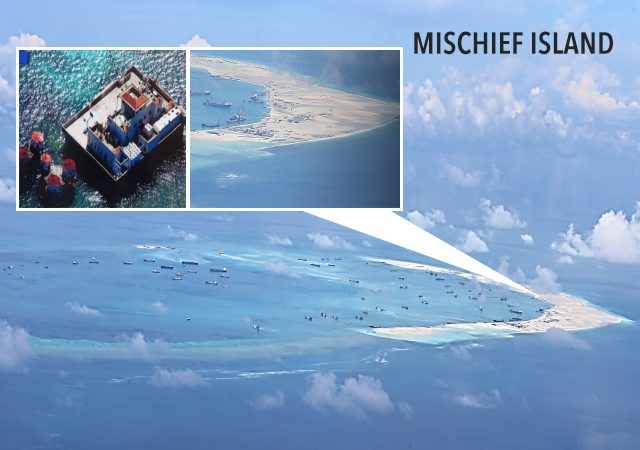SUMMARY
This is AI generated summarization, which may have errors. For context, always refer to the full article.

CARDIFF, United Kingdom – The United Nations-backed tribunal ruled that Filipino and Chinese fishermen both have “traditional fishing rights” in the 12 nautical mile territorial sea of Scarborough Shoal, effectively declaring the disputed area as a common fishing ground.
The Permanent Court of Arbitration reprimanded China for preventing Filipino fishermen from accessing the shoal to do their livelihood. It said it will reprimand the Philippines, too, if it prevented Chinese from fishing in that area.
“[The Tribunal] would reach the same conclusion with respect to the traditional fishing rights of Chinese fishermen if the Philippines were to prevent fishing by Chinese nationals at Scarborough Shoal,” the ruling said.
China claimed historic rights over Scarborough, claiming it to be an island with its own 200 nautical mile exclusive economic zone (EEZ) under the United Nations Convention on the Law of the Sea (UNCLOS).
China wrested control of the maritime feature from the Philippines in April 2012 following a tense standoff.
It was its determination to take Scarborough Shoal back that drove the former administration of President Benigno Aquino III to file the historic arbitration case and brave China’s wrath. (READ: Aquino legacy: Defying China)
The tribunal junked China’s claims that Scarborough is an island and favored the Philippine position that is only a “rock.” But the tribunal did not declare the Scarborough Shoal as part of the Philippine EEZ even when it is located within 100 nautical miles off the country’s baseline.
Scarborough’s territorial seas
Rocks like Scarborough Shoal have territorial seas and are thus sovereign territories that are excluded from the EEZ of countries, the tribunal said. The tribunal stressed that it does not have jurisdiction to rule on sovereignty issues.
“We asked the tribunal to rule that the territorial sea of Scarborough Shoal be declared traditional fishing ground of Filipino fishermen. We did not ask that the territorial sea of Scarborough Shoal be declared part of our EEZ because legally it could not be,” explained a senior member of the government team that handled the Philippine case.
The ruling recognized “traditional fishing rights” of Filipinos and other nationalities, but expressly limiting it to artisanal fishing (or small-scale) as opposed to industrial fishing.
“Artisanal fishing is used in contrast to “industrial fishing.” It does not exclude improvements in powering the small boats, in the techniques of navigation, communication or in the techniques of fishing; but the traditional regime of fishing does not extend to large-scale commercial or industrial fishing nor to fishing by nationals of third States in the Red Sea, whether small-scale or industrial,” the ruling said, quoting Eritrea v. Yemen.
The tribunal stressed that “traditional fishing rights” are private rights of individuals, which must be protected. “In archipelagic waters, traditional fishing rights are expressly protected, and Article 51(1) of the Convention provides that “an archipelagic State shall respect existing agreements with other States and shall recognize traditional fishing rights and other legitimate activities of the immediately adjacent neighbouring States in certain areas falling within archipelagic waters,” the ruling said.
The tribunal said “traditional fishing rights” of private individuals are different from the “historic rights” of states, which China asserted over almost the entire South China Sea. The tribunal declared the “nine-dash-line claim” of China in favor of freedom of navigation in one of the world’s busiest trade routes.
“In the exclusive economic zone, in contrast, traditional fishing rights are extinguished,” the ruling said.
Different ruling from Mischief Reef
The ruling on Mischief Reef, Second Thomas Shoal, and Reed Bank is different. They are not rocks but “low tide features” that form part of the Philippines’ EEZ, the tribunal said.

Low tide features do not have maritime zones. The 3 maritime features are also inside the 200 nautical mile zone of the Philippines.
How the Philippines can recover Mischief Reef, which has been reclaimed by China, is another matter. But the ruling is seen to deter China from continuing its aggressive actions in Second Thomas Shoal and Reed Bank, two flashpoint areas between Manila and Beijing. (READ: How to enforce Hague ruling? PH counsel explains)
The tribunal was able to declare them as part of Philippine EEZ in the absence of other EEZs or territorial seas that overlap with “any possible entitlement of China.”
What “possible entitlements” can China have?
The tribunal declared that maritime features in the Spratly Islands are not entitled to exclusive economic zones (200 nautical miles) but at least 11 of them are high tide features like Scarborough Shoal that are entitled to territorial seas (12 nautical miles).
These 11 maritime features are the following:
- Gaven Reef (North), reclaimed by China
- McKennan Reef, reclaimed by China
- Johnson Reef, reclaimed by China
- Cuarteron Reef, reclaimed by China
- Fiery Cross Reef, reclaimed by China to host an airstrip
- Itu Aba, occupied by Taiwan
- Thitu (Pag-Asa), occupied by about a hundred Filipino civilians
- West York Island (Likas), occupied by the Philippines
- Spratly Island, occupied by Vietnam
- North-East Cay (Parola), occupied by the Philippines
- South West Cay, occupied by Vietnam
Like the Scarborough Shoal, the tribunal cannot rule on the sovereignty of these 11 maritime features.
Where it all started
The ruling suggests that the Philippines did not have the standing to arrest Chinese fishermen in the shoal in April 2012, during the incident that prompted Aquino’s battle with China.
The Aquino administration lost effective control of Scarborough Shoal in April 2012 after a tense standoff with China that was prompted by Philippine Navy’s arrest Chinese fishermen in the area. Chinese Coast Guard ships immediately responded to assist its citizens, leading to the standoff. (READ: Timeline: The Philippines-China maritime dispute)
China’s actions suprised the Philippines, which had long occupied Scarborough Shoal. Its navy has traditionally arrested poachers in the area.
The Philippines sought the assistance of its treaty ally US, which was believed to have brokered an arrangement with China for both countries to withdraw from the standoff. The Philippines withdrew its warship, but China did not and has since occupied the shoal.
The Philippines continued to engage China, but Manila eventually lost hope in the talks and filed the case in April 2013. The Aquino administration then decided that a favorable arbitration ruling is its only hope to leverage with China. (READ: Aquino legacy: Defying China)
Case prompted China’s reclamation?
China began constructing artificial islands around the same time, prompting critics to say that the filing of the case worsened the situation because it prompted China’s aggressive behavior in the West Philippine Sea. (READ: PH case provoked China’s massive reclamation in the West Philippine Sea)
China reclaimed 7 maritime features to build airstrips and installed missile launchers, threatening the security in the region.
The rising superpower did not back down amid verbal threats from the US, which has traditionally dominated the waters in the West Philippine Sea.
China also rejected the July 12, 2016 ruling of the tribunal. “Do not turn the South China Sea into a cradle of war,” vice foreign minister Liu Zhenmin told reporters in Beijing, as he described the ruling as waste paper. – Rappler.com
Carmela Fonbuena is a multimedia reporter at Rappler. She is studying Political Communication at Cardiff University as a British Chevening scholar.
Add a comment
How does this make you feel?
There are no comments yet. Add your comment to start the conversation.